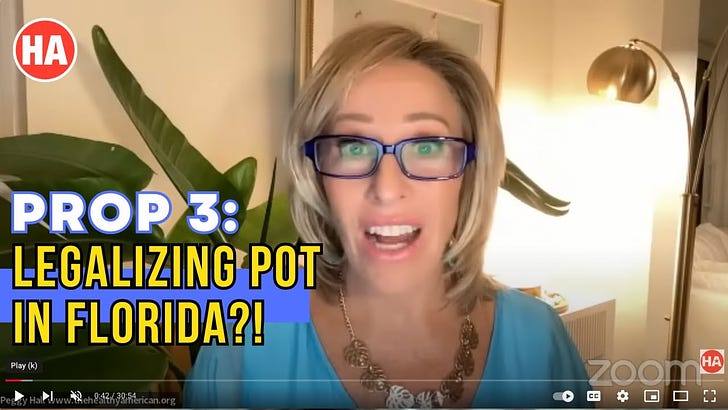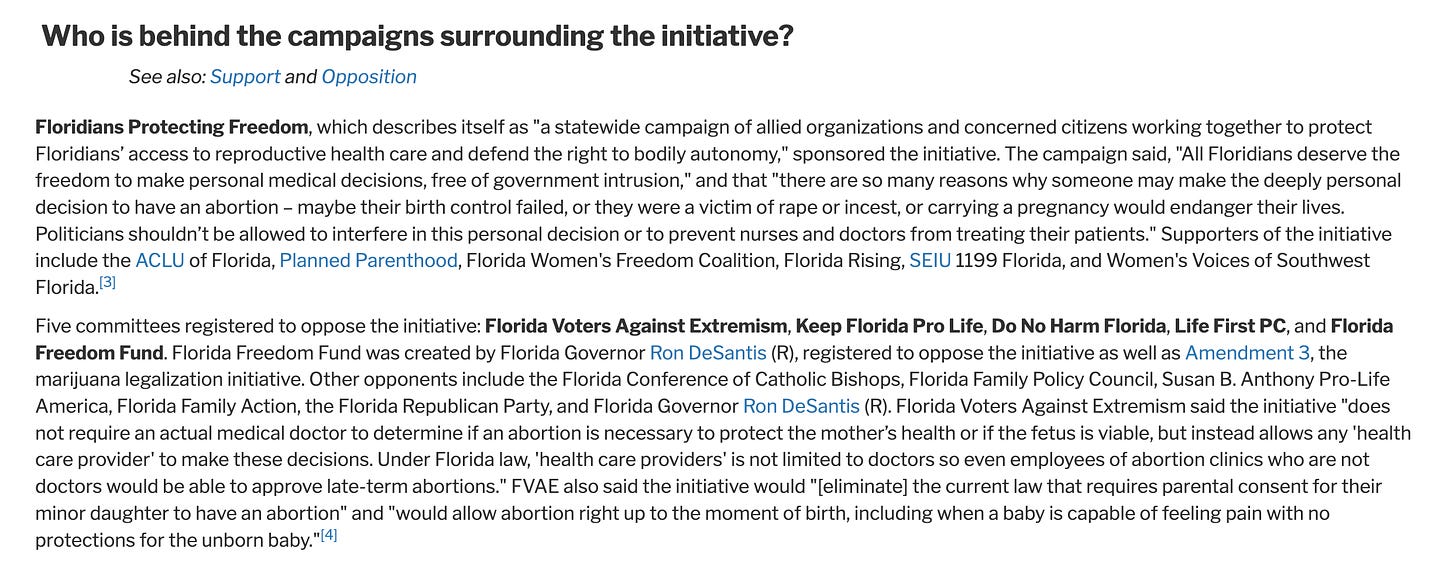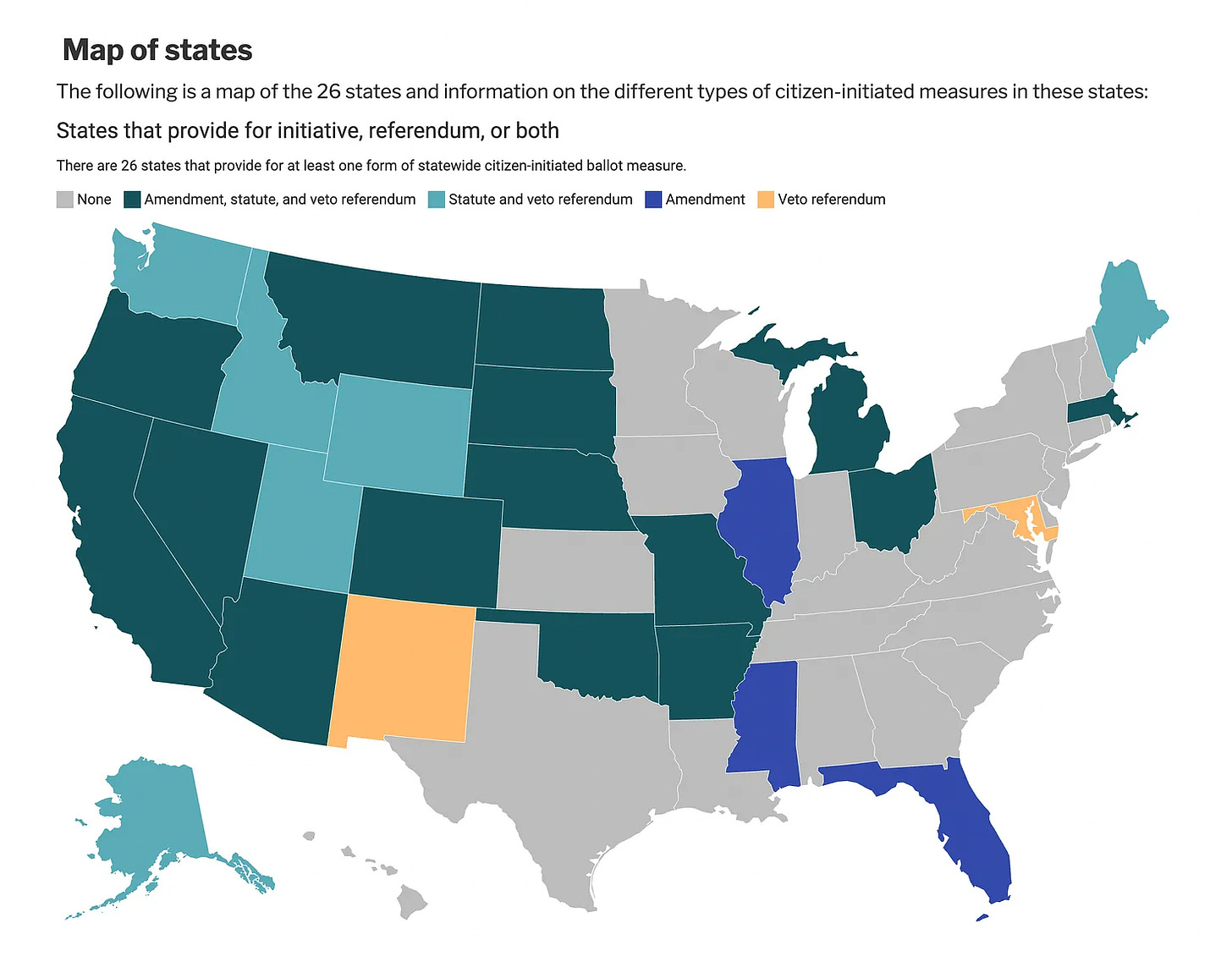FLORIDA "POT PROP" Controversy
Even those in favor of "cannabis for all" admit that this proposed state Constitutional Amendment squeezes out the little guy and benefits big business
If you are in Florida, there are a couple of potential Constitutional Amendments what you should be aware of: Prop 3 (expands government regulation over cannabis vendors) and Prop 4: (Allows for killing developing babies up until birth).
Let me get right to the punchline with Prop 3, which I covered in great detail in my video below…
Even those in favor of “cannabis for all” admit that this measure DOES NOT grant individuals the right to grow weed in their backyard. IT ONLY INCREASES GOVERNMENT LICENSING AND REGULATION.
Read that again in case you missed it: this bill does not “legalize” marijuana in the way some people think it does. You still cannot grow it or sell it on your own. This is only allowed for GOVERNMENT-LICENSED and REGULATED COMPANIES.
And it’s likely huge cannabis corporations like Trulieve and other big corps in the cannabis industry are NOT going to welcome competition from new mom-and-pops to enter the industry.
Florida Proposition 3: Marijuana Legalization Initiative
Click below to watch my take on the proposed pot prop in Florida:
Essentially, this proposition seeks to legalize recreational marijuana use for adults 21 and older. At first glance, it might seem like this measure is riding on the waves of similar initiatives passed in other states—painting it as a harmless way to let people relax and enjoy their lives in their own way.
This amendment would remove civil and criminal penalties for adults who purchase and use up to three ounces of marijuana from state-licensed retailers. In other words, adults would no longer face legal consequences for indulging in recreational marijuana, as long as they’re within those limits and purchased it from a state-licensed retailer.
How did this get on the ballot? More than a million Florida residents signed petitions in support of it, driven by a group called Smart & Safe Florida. Sounds grassroots, right? Well, not entirely. That group is almost wholly bankrolled by the marijuana company Trulieve, which makes this initiative feel less like a movement of the people and more like corporate interests pushing an agenda.
Ballot initiatives are no small feat—they take a lot of work and can be incredibly expensive. First, gathering the required number of signatures from registered voters is a huge task. In Florida, that means collecting hundreds of thousands of signatures, and it often involves hiring professional signature gatherers, which isn’t cheap. Then there’s the cost of advertising and educating the public on the initiative, as well as any legal fees for navigating state-specific rules and challenges when drafting the text of the measure.
So, most of the financial muscle behind that effort came from big corporations like Trulieve. These companies can afford the hefty price tag—millions of dollars—required to push an initiative through the system. This is why a lot of initiatives that make it onto the ballot are backed by corporate sponsors or interest groups with deep pockets.
What do supporters argue?
Proponents argue that legalizing marijuana allows the state to rake in tax benefits, offering a way to regulate and avoid dangerous substances in black-market marijuana. Plus, it would save people from getting slammed with unnecessary criminal penalties for using something that’s been legalized in other states. They paint this as a win-win situation for personal freedom and public safety.
Well looky here! A not-so-grassroots organization called “Smart & Safe Florida” 🤣 is behind this proposed measure. (Most Healthy Americans know that “smart” and “safe” are code words for “tyranny” and “oppression.”)
Smart & Safe Florida: "The industry is sustainable and growing. In 2020, when the state lost more than 400,000 jobs, Florida’s cannabis industry added 15,000 employees. ... Tax revenues from the legal cannabis industry for federal and state governments are projected to reach $4.06 billion in 2025, according to New Frontier data... If adult-use cannabis is legalized, Florida users will have accountability, transparency, and regulations in place to ensure products are not laced with or contain potentially deadly chemicals."
What are opponents saying?
While proponents of Prop 3 tout the benefits of legalizing marijuana—like increased tax revenue and consumer safety—there’s a darker side to this that often gets brushed under the rug. One of the risks we face with legalization is the potential expansion of the black market, and, even worse, opening the door to a mafia-like system where organized crime can creep in.
Even those in favor of “cannabis for all” admit that this measure DOES NOT grant individuals to grow weed in their backyard. IT ONLY INCREASES GOVERNMENT LICENSING AND REGULATION.
Read that again in case you missed it: this bill does not “legalize” marijuana in the way some people think it does. You still cannot grow it or sell it on your own. This is only allowed for GOVERNMENT-LICENSED and REGULATED COMPANIES.
And it’s likely Trulieve and other big corps in the cannabis industry are NOT going to welcome competition from new mom-and-pops to enter the industry.
Critics of Prop 3 argue that legalizing marijuana could lead to an increase in public nuisance issues—like that unmistakable marijuana stench wafting through neighborhoods and public spaces. Some also believe that this amendment would actually fuel the black market, as those not wanting to pay state-licensed retailers could continue to buy from unregulated sources.
U.S. Rep. Matt Gaetz (R-FL): "Regardless of how someone feels about abortion or marijuana, I don’t believe that those issues should be resolved in the state constitution
Florida Gov. Ron DeSantis (R): "[The initiatives] are very, very extreme. Once voters figure out how radical both of those are, they’re going to fail. It’s basically a license to have it anywhere you want. So no time, place and manner restrictions. This state will start to smell like marijuana in our cities and towns."
Vote No on 3 Spokeswoman Sarah Bascom: "Amendment 3 will have disastrous downstream consequences that will turn our state into an east coast version of California. It will threaten the health and safety of every community in Florida by allowing drug dealers to run rampant with zero consequences, creating a dangerous explosion in the black market, and forcing families to completely alter their lives to avoid exposure to secondhand smoke."
U.S. Sen. Rick Scott (R-FL): "I know that marijuana is a gateway drug. My brother just died in the last few months, starting with marijuana and he ended up struggling with alcohol and drugs, so I don’t support it."
Here’s the thing: Legalization doesn’t automatically eliminate the illegal trade. In fact, it can sometimes do the opposite by creating a two-tiered market. Not everyone is going to want to buy from state-licensed retailers, especially if the prices are higher due to taxes or regulations.
This is quite a controversial topic and I’d like to hear where you stand on the issue.
Florida Proposition 4: Right to Abortion Initiative
This proposition aims to enshrine the right to abortion in the Florida constitution, framing it as an issue of personal autonomy and healthcare access. But I’ve never been one to shy away from calling things like they are, and looking at the fact and reality that abortion is the taking of an innocent, vulnerable life.
Let me emphatically state that I have a great deal of compassion for all those who have been impacted by abortion. Many Healthy Americans have written to me telling me of their past experiences and how their attitude and perspective has changed over the years. They felt manipulated by the media and society to consider the growing baby as “just a clump of cells” and to put convenience over motherhood. They believed the “My body, my choice” slogans popularized in the 1970’s not realizing there was another body involved: a tiny, vulnerable, growing body that somehow didn’t get a “choice” in the matter.
Florida bans most abortions after six weeks of pregnancy. If passed, Amendment 4 would override that, and the following language would be added to the state constitution: "Except as provided in Article X, Section 22, no law shall prohibit, penalize, delay, or restrict abortion before viability or when necessary to protect the patient’s health, as determined by the patient’s healthcare provider."[1]
The amendment specifies it would not remove the Legislature’s ability to require parental notification before a minor child has an abortion.
The argument for abortion “rights” wrongs often hinges on “choice,” but what about the choice of the unborn?
I’m pro-life because I believe every life, from conception to natural death, is sacred. And while this proposition is cloaked in the language of “women’s rights” and “healthcare,” the fact remains that abortion ends a life. I understand that there are difficult, heartbreaking situations that drive some to consider it, but we have to ask ourselves: is the solution to one tragedy (an unplanned or difficult pregnancy) the creation of another (the intentional killing of a child)?
So, who is behind this initiative? Ballotpedia states:
Gee, planned parenthood… who woulda thought? I’m sure most of my Healthy Americans know the dark history behind planned parenthood and its ties to eugenics, population control, and forced sterilization.
When we look at Prop 4 through this historical lens, it’s impossible to ignore the dark undercurrents of the abortion movement and its disturbing roots. It’s anti-life, anti-God, and anti-freedom. The idea of “choice” is wrapped up in a pretty package, but the historical reality is much grimmer.
This isn’t about healthcare; it’s about the dehumanization of the most vulnerable among us—the unborn—and the continuation of a legacy that once sought to control who gets to live and who doesn’t. Florida voters have the opportunity to reject this narrative and stand for life in all its stages.
These controversial ballot initiatives could be decided by a very small margin — which underlines exactly why it is so important to vote. Even if you think the Presidential election rigged/corrupt/fixed/planned — you still have the right (and in my view, duty) to make your voice heard in these local issues.
For those who want to dive deeper into how these initiatives get onto the ballot in the first place, read on…
Understanding Ballot Initiatives — What is a Ballot Initiative? Do all states do this?
Ballot initiatives allow citizens to directly propose and vote on specific laws or constitutional amendments.
In general, ballot initiatives can be proposed by gathering enough signatures from registered voters, which then places the measure on the ballot for a vote during an election. If passed, these initiatives can either create new laws or amend the state constitution.
Not all states allow ballot initiatives. In the U.S., 24 states permit some form of ballot initiative process, while the remaining states rely solely on their legislatures to propose laws and constitutional amendments.
States that allow initiatives often have different rules about how they work—some only permit citizen initiatives to amend the state constitution, while others allow initiatives for statutory changes (new laws).
Florida, for example, only allows initiatives that amend the state constitution, which is why measures like the Marijuana Legalization Initiative (Prop 3) and the Right to Abortion Initiative (Prop 4) take the form of constitutional amendments rather than statutory law.
Any proposed constitutional amendment in Florida needs at least 60% voter approval to pass.
Ballotpedia is a great place to learn more about these ballot measures, including the objectives, the sponsors of the initiative, supporters and opposition and the text of the measure.
P.S. For my Christians in the audience, I wanted to share with you Pastor Kemble’s recent sermon called, “Should Christians Vote?” Pastor Kemble is a long-time Healthy American, a good old-fashioned-preacher, and a valued friend.
Let me know… are you voting, why or why not? I, for one, will cast my ballot. I have no control over the results, but I do have control over my actions, and at the very least, my participation will make it that much harder for the bad guys to cheat, steal and corrupt what should be a valid system.
















Peggy! First off, thank you so much for your support :) Greatly appreciated!
Thanks for toughing on these topics. I've touched on abortion already here (https://unorthodoxy.substack.com/p/how-the-word-abortion-hides-the-truth) and we see eye-to-eye here: a life is a life.
When it comes to Amendment 3, here are my thoughts:
1. I will admit that I was in favor of Amendment 3 because it decriminalizes weed. Whether I bought it from a distributor or from my good friend, I believe it would be hard to prove, so either or, this would be a positive in the right direction.
2. I also believe that, yes, while marijuana can be a gateway drug, it can also prevent people from actual petrochemical drugs, dangerous drugs with deadly side effects that are unwanted. To my earlier point, if I get the marijuana from neighbor, this ultimately keeps me off Rockefeller's FDA regulated drugs.
These are the positives that makes me support Amendment 3, but it also is a big corporation bill as you stated, which makes me weary. Also, if this is a step towards making FL like CA, then I do not want it. If the smell will be everywhere, then that is NOT a positive. And this is coming from me who does smoke marijuana from time to time.
This situation is why I struggle with voting as stated in this article (https://unorthodoxy.substack.com/p/wow-everything-we-know-about-democracy). It makes us have to choose, which I say is "Cognitive Dissonance": https://unorthodoxy.substack.com/p/how-voting-creates-cognitive-dissonance
Ultimately, if I want to do what I want to do and I am causing no harm to my fellow man, I should (and will) do what I want to do without needing the government's blessing. I think ideally, this is the mentality that we should all have.
Will I vote? I see both points, especially supporting local politics, but I'm leaning on not voting. Don't know if you've seen it or not, but there was a study showing millions of Christians are also in a similar boat of not voting: https://unorthodoxy.substack.com/p/104-million-americans-of-faith-are
As always, thanks for everything. :)
It’s a very interesting situation indeed, but it becomes a warped subject when given over to ridiculous people like the woman fearing her whole family will have to change their entire lifestyle to avoid marijuana smoke, which ALWAYS smells better than cigarette and especially cigar smoke, or the public serpent moaning certainty about his dead brother using weed as a “gateway” drug before dying of alcoholism. I’m guessing he had a booze problem long before he ever tried marijuana…personally, I’m all for avoiding big corporate initiatives and government over lords, so I’m all for the black market, growing weed in your yard if you want, brewing moonshine in the woods or any other damn thing you want that doesn’t hurt others.